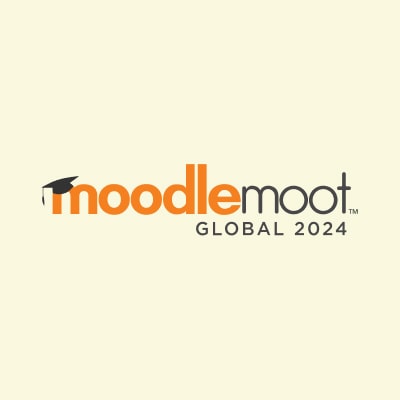After a tremendous Day 1, Day 2 of MoodleMoot Global was equally packed with insightful presentations, visionary thinking, and a glimpse into the future of education. The day started with a compelling keynote from Moodle Founder Martin Dougiamas, who shared his vision of what education will feel like in 2034. With a series of inspiring sessions that followed, including discussions on ethical AI in STEM education and transformative digital learning approaches, it became clear that the future of learning will be more inclusive, accessible, and engaging than ever.
Keynote by Moodle Founder Martin Dougiamas: What will education feel like in 2034?
Martin Dougiamas captivated the audience by exploring what the next decade could look like for education. His keynote analysed how current trends in technology, artificial intelligence, and global connectivity are reshaping the educational landscape. Martin emphasised that the ongoing work of Moodle’s new Research team is focused on pushing the boundaries of what is possible within education, aiming for a learning experience that feels deeply human while powered by the latest technological advancements.
Martin presented a scenario where education in 2034 will be far more immersive and personalised. Students might engage with content in augmented and virtual realities, allowing for hands-on learning experiences from anywhere in the world. There’s a strong emphasis on accessibility, inclusivity, and breaking down geographical, financial, or physical barriers. He also highlighted the importance of open-source collaboration in making education more democratic and available to all.
Creating inclusive, engaging, and accessible STEM content in Moodle using ethical AI-powered voice technology
Next was an eye-opening presentation by Jarno Aantjes of ReadSpeaker, titled Creating Inclusive, Engaging, and Accessible STEM Content in Moodle using Ethical AI-powered Voice Technology. Aantjes focused on how AI-powered voice and text-to-speech (TTS) technology can play a pivotal role in making STEM education more accessible to students with diverse needs and abilities.
He detailed how ReadSpeaker’s integration within Moodle provides seamless audio assistance for users, enabling dyslexic, neurodivergent, visually impaired, and multilingual learners to interact with content more engagingly. Aantjes stressed that TTS isn’t merely about accessibility—it’s a core element of Universal Design for Learning (UDL). By allowing students to hear content, TTS helps improve comprehension, engagement, and retention. In STEM subjects, which often involve complex terminology and heavy reading, the ability to listen to materials can level the playing field for students who might otherwise struggle.
In addition to demonstrating how TTS can enhance the learning experience, Aantjes shared real-world examples, such as the STEM Olympiades, where TTS technology was successfully integrated into assessments, showing how it brings continuity to learning inside and outside the classroom. The presentation wrapped up with a Q&A session, during which participants discussed the potential of ethical AI in improving student outcomes and access to STEM education globally.
Desbloqueando el Potencial de la Educación Online: El Caso de la Universidad de Burgos
In a session that emphasised the power of online education, Alex Vea from Smowltech presented Desbloqueando el Potencial de la Educación Online: El Caso de la Universidad de Burgos, a Spanish-language presentation that showcased how the University of Burgos has transformed higher education using Moodle and digital proctoring tools.
The university has embraced the flexibility of online education, expanding accessibility and enhancing sustainability. Vea highlighted the results of a comprehensive survey showing that 71% of students chose online education to balance family and work commitments, emphasising the need for flexible learning options in today’s world. Furthermore, the case study showed that Moodle’s integrations have significantly reduced geographical and financial barriers, with 21% of students citing distance and 5% mentioning financial constraints as key reasons for choosing online learning. Another 4% of respondents noted that online education helped overcome physical and cognitive challenges.
Perhaps one of the most striking findings was the environmental impact—over one tonne of CO2 emissions was saved through the university’s adoption of digital learning, underscoring the sustainability benefits of this approach. With 15% of the University of Burgos’s students now enrolled in online programs, Vea highlighted the potential for online education to achieve quality standards equivalent to traditional face-to-face learning while also opening doors to internationalisation and broader student participation.
Reflecting on Day 2
Day 2 of MoodleMoot Global 2024 was a powerful reminder of how education is rapidly evolving. With visionaries like Martin Dougiamas leading the charge and innovators such as Jarno Aantjes and Alex Vea showcasing the tangible impacts of technology and online learning, it became clear that Moodle continues to be at the forefront of driving change in the educational sector.
Highlights included the introduction of inclusive, AI-powered voice technology that is revolutionising STEM education and the development of sustainable, flexible online programs that are reshaping universities. Day 2 offered a comprehensive look at how education is becoming more inclusive, adaptable, and prepared to meet the challenges of tomorrow. As the event continues, the future of education feels more exciting and equitable, ensuring that every learner can thrive in a rapidly changing world.
The day ended with the lively Colour Fiesta party, where attendees could network in a relaxed and festive atmosphere. The highlight of the evening was the “best costume” competition, where the most vibrant and creative outfits were on full display. The winner will be announced during the closing session!
Looking forward to Day 3
As Day 2 came to a close, the excitement for the final day of MoodleMoot Global 2024 was palpable. The final day promises even more insightful presentations, hands-on workshops, and opportunities to connect with thought leaders and peers worldwide.
Day 3 is set to be a fitting conclusion to an incredible event, whether delving deeper into cutting-edge Moodle integrations or exploring new ways to foster global collaboration in education.
Read the original article at moodle.com/news
